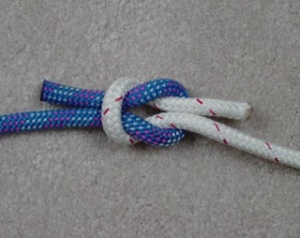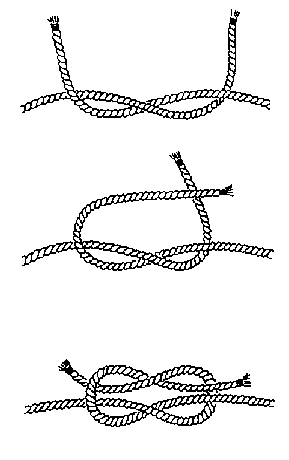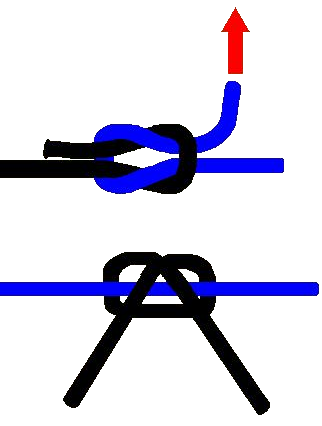Reef Knot
The reef knot or square knot is an ancient and simple binding knot used to secure a rope or line around an object. Although the reef knot is often seen used for tying two ropes together, it is not recommended for this purpose due to potential instability of the knot.
A reef knot is formed by tying a left-handed overhand knot and then a right-handed overhand knot, or vice versa. A common mnemonic for this procedure is "right over left, left over right", which is often appended with the rhyming suffix "... makes a knot both tidy and tight". Two consecutive overhands of the same handedness will make a granny knot. The working ends of the reef knot must emerge both at the top or both at the bottom, otherwise a thief knot results.
Contents |
Steps
Videos
Usage
The reef knot is used to tie the two ends of a single line together such that they will secure something, for example a bundle of objects, that is unlikely to move much. In addition to being used by sailors for reefing and furling sails, it is also one of the key knots of macrame textiles.The knot lies flat when made with cloth and has been used for tying bandages for millennia. As a binding knot it was known to the ancient Greeks as the Hercules knot (Herakleotikon hamma) and is still used extensively in medicine.
Misuse as a bend
The reef knot's familiarity, ease of tying, and visually appealing symmetry conceal its weakness. The International Guild of Knot Tyers warns that this knot should never be used to bend two ropes together. A proper bend knot, for instance a sheet bend or double fisherman's knot, should be used instead. Knotting authority Clifford Ashley claimed that misused reef knots have caused more deaths and injuries than all other knots combined. Further, it is easily confused with the granny knot, which is a very poor knot.
Untie
The reef knot can capsize (spill) when one of the free ends is pulled outward.


